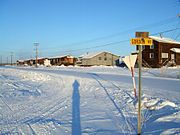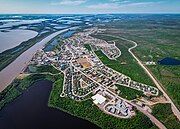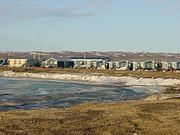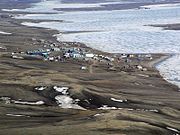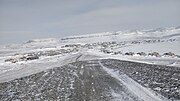Inuvik Region
Inuvik Region | |
|---|---|
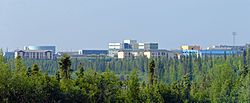 Skyline of the town of Inuvik | |
 Location within the Northwest Territories | |
| Country | Canada |
| Territory | Northwest Territories |
| Federal riding | Northwest Territories |
| Territorial ridings | Inuvik Boot Lake Inuvik Twin Lakes Mackenzie Delta Nunakput |
| Regional office[1] | Inuvik |
| Area | |
• Total | 387,400 km2 (149,600 sq mi) |
| Population (2021)[2] | |
• Total | 6,205 |
| • Rank | 3rd NWT |
| • Density | 0.016/km2 (0.041/sq mi) |
| • % change (from 2016) | −1.9 |
| Time zone | UTC−07:00 (MST) |
| • Summer (DST) | UTC−06:00 (DST) |
The Inuvik Region or Beaufort Delta Region is one of five administrative regions in the Northwest Territories of Canada. According to Municipal and Community Affairs the region consists of eight communities with the regional office situated in Inuvik.[1] Most of the communities are in the Beaufort Sea area and are a mixture of Inuit (mostly Inuvialuit) and First Nations (mostly Gwichʼin).
Formerly, there was also a Statistics Canada designated census division named Inuvik Region, Northwest Territories, which was abolished in the 2011 Canadian census. The territorial extent of this census division was somewhat larger than the administrative region of the same name.
Administrative Region communities
[edit]The Inuvik Region administrative entity includes the following communities:
| Community | Demographics (2021) | ||||||||
|---|---|---|---|---|---|---|---|---|---|
| Name[4] | Governance | Census[2] | Indigenous population profile[5] | ||||||
| Official | Traditional | Type[6] | Municipality[7] | Total | Change (from 2016) |
First Nations | Métis | Inuit (Inuvialuit) |
Other |
| Aklavik | Akłarvik | Hamlet | Yes | 536 | -9.2% | 220 | 15 | 390 | 70 |
| Fort McPherson | Teetł'it Zheh | Hamlet | Yes | 647 | -7.6% | 560 | 30 | 85 | 105 |
| Inuvik | Inuuvik | Town | Yes | 3,137 | -3.3% | 840 | 125 | 1,415 | 1,570 |
| Paulatuk | Paulatuuq | Hamlet | Yes | 298 | 12.5% | 0 | 0 | 280 | 40 |
| Sachs Harbour | Ikaahuk | Hamlet | Yes | 104 | 1.0% | 10 | 0 | 95 | 35 |
| Tsiigehtchic | Tsiigehtshik | Charter community | Yes | 138 | -19.8% | 115 | 15 | 0 | 55 |
| Tuktoyaktuk | Tuktuujaqrtuuq | Hamlet | Yes | 937 | 4.3% | 45 | 0 | 825 | 140 |
| Ulukhaktok | Ulukhaqtuuq | Hamlet | Yes | 408 | 3.0% | 10 | 0 | 380 | 50 |
|
| |||||||||||||||||||||||||||||||||||||||||||||||||||||||||
| Sources: NWT Bureau of Statistics (2001 - 2017)[8] | ||||||||||||||||||||||||||||||||||||||||||||||||||||||||||
Communities in the Inuvik Region
[edit]Climate
[edit]| Climate data for Fort McPherson (Fort McPherson Airport) Climate ID: 2201601; coordinates 67°24′28″N 135°51′37″W / 67.40778°N 135.86028°W; elevation: 35.4 m (116 ft); 1991–2020 normals, extremes 1892–present[a] | |||||||||||||
|---|---|---|---|---|---|---|---|---|---|---|---|---|---|
| Month | Jan | Feb | Mar | Apr | May | Jun | Jul | Aug | Sep | Oct | Nov | Dec | Year |
| Record high humidex | 9.0 | 7.6 | 11.5 | 15.7 | 28.3 | 38.8 | 35.0 | 40.4 | 27.0 | 24.1 | 5.0 | 4.6 | 40.4 |
| Record high °C (°F) | 6.1 (43.0) |
10.0 (50.0) |
11.8 (53.2) |
16.7 (62.1) |
29.5 (85.1) |
32.0 (89.6) |
33.3 (91.9) |
33.0 (91.4) |
27.2 (81.0) |
24.1 (75.4) |
10.0 (50.0) |
9.0 (48.2) |
33.3 (91.9) |
| Mean daily maximum °C (°F) | −23.2 (−9.8) |
−21.0 (−5.8) |
−14.0 (6.8) |
−3.1 (26.4) |
7.6 (45.7) |
18.5 (65.3) |
20.0 (68.0) |
16.5 (61.7) |
8.2 (46.8) |
−3.3 (26.1) |
−15.3 (4.5) |
−21.4 (−6.5) |
−2.5 (27.5) |
| Daily mean °C (°F) | −26.9 (−16.4) |
−24.9 (−12.8) |
−19.2 (−2.6) |
−8.9 (16.0) |
2.7 (36.9) |
13.1 (55.6) |
15.1 (59.2) |
11.9 (53.4) |
4.6 (40.3) |
−6.6 (20.1) |
−18.9 (−2.0) |
−25.0 (−13.0) |
−6.9 (19.6) |
| Mean daily minimum °C (°F) | −30.6 (−23.1) |
−28.8 (−19.8) |
−24.6 (−12.3) |
−14.9 (5.2) |
−2.4 (27.7) |
7.7 (45.9) |
10.2 (50.4) |
7.3 (45.1) |
1.1 (34.0) |
−9.1 (15.6) |
−22.3 (−8.1) |
−28.8 (−19.8) |
−11.3 (11.7) |
| Record low °C (°F) | −55.6 (−68.1) |
−55.0 (−67.0) |
−48.9 (−56.0) |
−44.4 (−47.9) |
−25.6 (−14.1) |
−6.7 (19.9) |
−1.1 (30.0) |
−6.7 (19.9) |
−19.5 (−3.1) |
−37.5 (−35.5) |
−46.7 (−52.1) |
−50.6 (−59.1) |
−55.6 (−68.1) |
| Record low wind chill | −58.9 | −56.8 | −54.4 | −41.6 | −32.6 | −9.2 | 0.0 | −4.8 | −17.5 | −40.2 | −50.0 | −59.7 | −59.7 |
| Average precipitation mm (inches) | 13.6 (0.54) |
12.8 (0.50) |
13.2 (0.52) |
8.1 (0.32) |
14.1 (0.56) |
27.8 (1.09) |
48.6 (1.91) |
38.2 (1.50) |
38.7 (1.52) |
34.8 (1.37) |
27.3 (1.07) |
17.0 (0.67) |
294.3 (11.59) |
| Average rainfall mm (inches) | 0.0 (0.0) |
0.0 (0.0) |
0.0 (0.0) |
0.2 (0.01) |
9.4 (0.37) |
27.4 (1.08) |
48.6 (1.91) |
38.2 (1.50) |
30.1 (1.19) |
1.2 (0.05) |
0.0 (0.0) |
0.0 (0.0) |
155.0 (6.10) |
| Average snowfall cm (inches) | 13.6 (5.4) |
12.8 (5.0) |
13.2 (5.2) |
7.9 (3.1) |
4.7 (1.9) |
0.2 (0.1) |
0.0 (0.0) |
0.1 (0.0) |
8.1 (3.2) |
33.7 (13.3) |
27.3 (10.7) |
17.0 (6.7) |
138.7 (54.6) |
| Average precipitation days (≥ 0.2 mm) | 5.5 | 4.7 | 6.0 | 3.7 | 5.2 | 7.1 | 10.7 | 11.2 | 12.1 | 10.7 | 8.7 | 6.8 | 92.5 |
| Average rainy days (≥ 0.2 mm) | 0.0 | 0.0 | 0.0 | 0.12 | 3.2 | 7.1 | 10.7 | 11.2 | 9.8 | 0.71 | 0.0 | 0.0 | 42.8 |
| Average snowy days (≥ 0.2 cm) | 5.5 | 4.7 | 6.0 | 3.6 | 2.0 | 0.12 | 0.0 | 0.05 | 2.6 | 10.1 | 8.7 | 6.8 | 50.2 |
| Source: Environment and Climate Change Canada[9] (January maximum / minimum)[10][11] (February maximum / minimum)[12][13] (March minimum)[14] (April maximum / minimum)[15][16] (May minimum)[17] (June minimum)[18] (July minimum)[19] (August maximum / minimum)[20][21] (September maximum)[22] (November minimum)[23] (December minimum)[24] | |||||||||||||
| Climate data for Inuvik (Inuvik (Mike Zubko) Airport) Climate ID: 2202570; coordinates 68°18′15″N 133°28′58″W / 68.30417°N 133.48278°W; elevation: 67.7 m (222 ft); 1991–2020 normals, extremes 1957–present[b] | |||||||||||||
|---|---|---|---|---|---|---|---|---|---|---|---|---|---|
| Month | Jan | Feb | Mar | Apr | May | Jun | Jul | Aug | Sep | Oct | Nov | Dec | Year |
| Record high humidex | 5.9 | 4.9 | 8.4 | 14.9 | 29.2 | 35.8 | 40.0 | 36.6 | 26.7 | 20.6 | 10.0 | 5.0 | 40.0 |
| Record high °C (°F) | 7.1 (44.8) |
5.2 (41.4) |
8.7 (47.7) |
15.3 (59.5) |
30.1 (86.2) |
32.8 (91.0) |
33.0 (91.4) |
34.8 (94.6) |
26.7 (80.1) |
20.9 (69.6) |
10.6 (51.1) |
5.0 (41.0) |
34.8 (94.6) |
| Mean daily maximum °C (°F) | −21.4 (−6.5) |
−19.5 (−3.1) |
−16.3 (2.7) |
−5.6 (21.9) |
6.3 (43.3) |
17.5 (63.5) |
19.3 (66.7) |
15.4 (59.7) |
7.9 (46.2) |
−3.0 (26.6) |
−14.3 (6.3) |
−19.7 (−3.5) |
−2.8 (27.0) |
| Daily mean °C (°F) | −24.9 (−12.8) |
−23.5 (−10.3) |
−21.1 (−6.0) |
−10.6 (12.9) |
1.5 (34.7) |
11.6 (52.9) |
14.2 (57.6) |
10.9 (51.6) |
4.4 (39.9) |
−5.9 (21.4) |
−17.6 (0.3) |
−23.0 (−9.4) |
−7.0 (19.4) |
| Mean daily minimum °C (°F) | −28.4 (−19.1) |
−27.3 (−17.1) |
−25.8 (−14.4) |
−15.5 (4.1) |
−3.3 (26.1) |
5.7 (42.3) |
9.0 (48.2) |
6.4 (43.5) |
0.8 (33.4) |
−8.6 (16.5) |
−20.8 (−5.4) |
−26.4 (−15.5) |
−11.2 (11.8) |
| Record low °C (°F) | −54.4 (−65.9) |
−56.7 (−70.1) |
−50.6 (−59.1) |
−46.1 (−51.0) |
−27.8 (−18.0) |
−6.1 (21.0) |
−3.3 (26.1) |
−6.1 (21.0) |
−20.1 (−4.2) |
−35.0 (−31.0) |
−46.1 (−51.0) |
−50.0 (−58.0) |
−56.7 (−70.1) |
| Record low wind chill | −64.1 | −67.0 | −59.6 | −51.1 | −35.2 | −13.3 | −5.2 | −9.2 | −23.4 | −43.1 | −55.0 | −59.6 | −67.0 |
| Average precipitation mm (inches) | 13.4 (0.53) |
10.8 (0.43) |
13.6 (0.54) |
9.9 (0.39) |
13.7 (0.54) |
23.5 (0.93) |
40.1 (1.58) |
42.4 (1.67) |
32.5 (1.28) |
23.0 (0.91) |
15.2 (0.60) |
11.7 (0.46) |
249.8 (9.83) |
| Average rainfall mm (inches) | — | 0.0 (0.0) |
0.0 (0.0) |
0.3 (0.01) |
6.0 (0.24) |
— | 31.8 (1.25) |
36.0 (1.42) |
17.7 (0.70) |
1.1 (0.04) |
0.3 (0.01) |
0.0 (0.0) |
— |
| Average snowfall cm (inches) | — | 22.7 (8.9) |
23.1 (9.1) |
13.3 (5.2) |
9.7 (3.8) |
— | 0.0 (0.0) |
0.7 (0.3) |
— | 32.9 (13.0) |
29.7 (11.7) |
25.7 (10.1) |
— |
| Average precipitation days (≥ 0.2 mm) | 10.8 | 10.2 | 11.9 | 8.0 | 8.1 | 8.9 | 12.8 | 14.8 | 13.9 | 14.8 | 14.1 | 11.2 | 139.5 |
| Average rainy days (≥ 0.2 mm) | — | 0.1 | 0.0 | 0.1 | 2.7 | — | 9.6 | 13.0 | 8.9 | 0.9 | 0.2 | 0.2 | — |
| Average snowy days (≥ 0.2 cm) | — | 11.6 | 11.9 | 5.6 | 4.2 | — | 0.1 | 0.6 | — | 11.5 | 12.3 | 10.9 | — |
| Average relative humidity (%) (at 1500 LST) | 68.7 | 66.6 | 58.5 | 57.5 | 57.9 | 49.7 | 57.2 | 64.1 | 70.1 | 79.4 | 76.6 | 71.2 | 64.8 |
| Mean monthly sunshine hours | 7.3 | 65.2 | 174.1 | 248.7 | 295.0 | 375.1 | 339.8 | 216.2 | 109.4 | 50.2 | 17.8 | 0.0 | 1,898.8 |
| Source: Environment and Climate Change Canada[25] (January maximum)[26] (April maximum)[27] (May maximum)[28] (July maximum)[29] (August maximum)[30] (sunshine)[31] | |||||||||||||
| Climate data for Sachs Harbour (Sachs Harbour (David Nasogaluak Jr. Saaryuaq) Airport} Climate ID: 2503650; coordinates 72°00′N 125°16′W / 72.000°N 125.267°W; elevation: 86.3 m (283 ft); 1991–2020 normals[c] | |||||||||||||
|---|---|---|---|---|---|---|---|---|---|---|---|---|---|
| Month | Jan | Feb | Mar | Apr | May | Jun | Jul | Aug | Sep | Oct | Nov | Dec | Year |
| Record high humidex | 15.0 | −6.1 | −3.2 | 2.6 | 9.4 | 22.1 | 31.9 | 26.0 | 15.9 | 3.9 | 1.1 | −4.0 | 31.9 |
| Record high °C (°F) | −4.4 (24.1) |
−4.5 (23.9) |
−3.2 (26.2) |
5.4 (41.7) |
10.0 (50.0) |
20.5 (68.9) |
24.2 (75.6) |
23.2 (73.8) |
15.6 (60.1) |
4.4 (39.9) |
1.7 (35.1) |
−4.0 (24.8) |
24.2 (75.6) |
| Mean daily maximum °C (°F) | −23.8 (−10.8) |
−24.4 (−11.9) |
−22.8 (−9.0) |
−13.6 (7.5) |
−3.6 (25.5) |
6.3 (43.3) |
9.8 (49.6) |
7.2 (45.0) |
1.5 (34.7) |
−6.5 (20.3) |
−15.3 (4.5) |
−21.7 (−7.1) |
−8.9 (16.0) |
| Daily mean °C (°F) | −27.4 (−17.3) |
−27.8 (−18.0) |
−26.4 (−15.5) |
−17.2 (1.0) |
−6.6 (20.1) |
3.4 (38.1) |
6.5 (43.7) |
4.4 (39.9) |
−0.6 (30.9) |
−9.3 (15.3) |
−18.6 (−1.5) |
−25.1 (−13.2) |
−12.1 (10.2) |
| Mean daily minimum °C (°F) | −31.0 (−23.8) |
−31.2 (−24.2) |
−29.9 (−21.8) |
−20.8 (−5.4) |
−9.4 (15.1) |
0.4 (32.7) |
3.3 (37.9) |
1.5 (34.7) |
−2.8 (27.0) |
−12.2 (10.0) |
−22.1 (−7.8) |
−28.5 (−19.3) |
−15.2 (4.6) |
| Record low °C (°F) | −52.2 (−62.0) |
−50.2 (−58.4) |
−48.4 (−55.1) |
−43.0 (−45.4) |
−26.7 (−16.1) |
−16.5 (2.3) |
−5.0 (23.0) |
−11.0 (12.2) |
−22.8 (−9.0) |
−35.5 (−31.9) |
−42.8 (−45.0) |
−45.0 (−49.0) |
−52.2 (−62.0) |
| Record low wind chill | −71.6 | −68.1 | −66.1 | −58.4 | −40.3 | −22.1 | −10.3 | −16.0 | −31.2 | −44.9 | −55.5 | −64.1 | −71.6 |
| Average precipitation mm (inches) | 5.8 (0.23) |
5.3 (0.21) |
8.5 (0.33) |
9.4 (0.37) |
6.7 (0.26) |
9.4 (0.37) |
14.2 (0.56) |
25.5 (1.00) |
21.2 (0.83) |
17.7 (0.70) |
9.5 (0.37) |
6.6 (0.26) |
139.7 (5.50) |
| Average rainfall mm (inches) | 0.0 (0.0) |
0.0 (0.0) |
0.0 (0.0) |
0.0 (0.0) |
0.2 (0.01) |
4.5 (0.18) |
13.6 (0.54) |
— | 9.1 (0.36) |
— | 0.0 (0.0) |
0.0 (0.0) |
— |
| Average snowfall cm (inches) | 6.0 (2.4) |
6.5 (2.6) |
— | 7.7 (3.0) |
— | 2.2 (0.9) |
0.3 (0.1) |
3.1 (1.2) |
10.6 (4.2) |
— | — | — | — |
| Average precipitation days (≥ 0.2 mm) | 8.9 | 6.2 | 8.7 | 7.5 | 7.9 | 5.7 | 7.7 | 13.8 | 13.7 | 14.3 | 11.2 | 7.8 | 113.2 |
| Average rainy days (≥ 0.2 mm) | 0.0 | 0.0 | 0.0 | 0.0 | 0.4 | 3.1 | 6.8 | — | 5.6 | — | 0.0 | 0.0 | — |
| Average snowy days (≥ 0.2 cm) | 8.2 | 6.2 | — | 6.2 | — | 1.4 | 0.4 | 3.0 | 7.4 | — | — | — | — |
| Average relative humidity (%) (at 1500 LST) | 78.4 | 77.3 | 79.1 | 82.2 | 83.4 | 80.6 | 78.2 | 84.3 | 87.2 | 89.5 | 85.4 | 80.7 | 82.2 |
| Mean monthly sunshine hours | 0.1 | 42.6 | 165.8 | 264.8 | 284.6 | 330.6 | 335.7 | 189.8 | 79.7 | 38.7 | 4.3 | 0.0 | 1,736.7 |
| Source: Environment and Climate Change Canada Canadian Climate Normals 1991-2020[32] (sunshine)[33] | |||||||||||||
Notes
[edit]- ^ Climate data was recorded at Fort McPherson from October 1892 to June 1977 and at Fort McPherson Airport from August 1981 to present. Composite data from Fort McPherson A; Climate ID: 2201606; coordinates 67°24′25″N 135°31′35″W / 67.40694°N 135.52639°W; elevation: 35.4 m (116 ft)
- ^ Includes composite data from Inuvik A: Climate ID: 2202571; coordinates 68°18′14″N 133°28′59″W / 68.30389°N 133.48306°W; elevation: 67.7 m (222 ft) and Inuvik Climate / Inuvik UA; WMO ID: 71364 / 71957; 68°19′N 133°31′W / 68.317°N 133.517°W; elevation: 103.0 m (337.9 ft) / 103.2 m (339 ft). Sunshine from 1951–1980
- ^ Composite data from Sachs Harbour A; Climate ID: 2503649; coordinates 72°59′37″N 125°14′29″W / 72.99361°N 125.24139°W; elevation: 86.3 m (283 ft) and Sachs Harbour Climate; Climate ID: 2503648; coordinates 72°59′33″N 125°15′15″W / 72.99250°N 125.25417°W; elevation: 87.5 m (287 ft). Sunshine from 1951–1980
References
[edit]- ^ a b Inuvik Region
- ^ a b "Population and dwelling counts, for Canada, provinces and territories, and census subdivisions (municipalities), 2021 and 2016 censuses – 100% data". Statistics Canada. 8 December 2024. Retrieved 8 December 2024.
- ^ Government of the Northwest Territories. "About Municipal and Community Affairs". Retrieved 17 June 2019.
- ^ "Northwest Territories Official Community Names and Pronunciation Guide". Prince of Wales Northern Heritage Centre. Yellowknife: Education, Culture and Employment, Government of the Northwest Territories. Archived from the original on 13 January 2016. Retrieved 13 January 2016.
- ^ "Indigenous Population Profile, 2021 Census of Population". Statistics Canada. 16 June 2023. Retrieved 8 December 2024.
- ^ "Differences in Community Government Structures" (PDF). Maca.gov.nt.ca. Retrieved 18 December 2014.
- ^ "List of municipalities - Northwest Territories". Canada Revenue Agency. 16 June 2015. Retrieved 10 December 2024.
- ^ Population Estimates By Community from the GNWT
- ^ "Fort McPherson A". Canadian Climate Normals 1981–2010. Environment and Climate Change Canada. 1 October 2024. Climate ID: 2201601. Retrieved 8 December 2024.
- ^ "Daily Data Report for January 1916 Fort McPherson". Canadian Climate Data. Environment and Climate Change Canada. 1 October 2024. Climate ID: 2201600. Retrieved 8 December 2024.
- ^ "Daily Data Report for January 1894 Fort McPherson". Canadian Climate Data. Environment and Climate Change Canada. 1 October 2024. Climate ID: 2201600. Retrieved 8 December 2024.
- ^ "Daily Data Report for February 1911 Fort McPherson". Canadian Climate Data. Environment and Climate Change Canada. 1 October 2024. Climate ID: 2201600. Retrieved 8 December 2024.
- ^ "Daily Data Report for February 1968 Fort McPherson". Canadian Climate Data. Environment and Climate Change Canada. 1 October 2024. Climate ID: 2201600. Retrieved 8 December 2024.
- ^ "Daily Data Report for March 1897 Fort McPherson". Canadian Climate Data. Environment and Climate Change Canada. 1 October 2024. Climate ID: 2201600. Retrieved 8 December 2024.
- ^ "Daily Data Report for April 1960 Fort McPherson". Canadian Climate Data. Environment and Climate Change Canada. 1 October 2024. Climate ID: 2201600. Retrieved 8 December 2024.
- ^ "Daily Data Report for April 1899 Fort McPherson". Canadian Climate Data. Environment and Climate Change Canada. 1 October 2024. Climate ID: 2201600. Retrieved 8 December 2024.
- ^ "Daily Data Report for May 1935 Fort McPherson". Canadian Climate Data. Environment and Climate Change Canada. 1 October 2024. Climate ID: 2201600. Retrieved 8 December 2024.
- ^ "Daily Data Report for June 1918 Fort McPherson". Canadian Climate Data. Environment and Climate Change Canada. 1 October 2024. Climate ID: 2201600. Retrieved 8 December 2024.
- ^ "Daily Data Report for July 1918 Fort McPherson". Canadian Climate Data. Environment and Climate Change Canada. 1 October 2024. Climate ID: 2201600. Retrieved 8 December 2024.
- ^ "Daily Data Report for April 1960 Fort McPherson A". Canadian Climate Data. Environment and Climate Change Canada. 1 October 2024. Climate ID: 2201606. Retrieved 8 December 2024.
- ^ "Daily Data Report for August 1928 Fort McPherson". Canadian Climate Data. Environment and Climate Change Canada. 1 October 2024. Climate ID: 2201600. Retrieved 8 December 2024.
- ^ "Daily Data Report for September 1940 Fort McPherson". Canadian Climate Data. Environment and Climate Change Canada. 1 October 2024. Climate ID: 2201600. Retrieved 8 December 2024.
- ^ "Daily Data Report for November 1927 Fort McPherson". Canadian Climate Data. Environment and Climate Change Canada. 1 October 2024. Climate ID: 2201600. Retrieved 8 December 2024.
- ^ "Daily Data Report for December 1937 Fort McPherson". Canadian Climate Data. Environment and Climate Change Canada. 1 October 2024. Climate ID: 2201600. Retrieved 8 December 2024.
- ^ "Inuvik A". Canadian Climate Normals 1991–2020. Environment and Climate Change Canada. 1 October 2024. Climate ID: 2202570. Retrieved 8 December 2024.
- ^ "Daily Data Report for January 2009, Inuvik AWOS A". Canadian Climate Data. Environment and Climate Change Canada. 1 October 2024. WMO ID: 71957. Retrieved 8 December 2024.
- ^ "Daily Data Report for April 2009, Inuvik AWOS A". Canadian Climate Data. Environment and Climate Change Canada. 1 October 2024. WMO ID: 71957. Retrieved 8 December 2024.
- ^ "Daily Data Report for May 2010, Inuvik AWOS A". Canadian Climate Data. Environment and Climate Change Canada. 1 October 2024. WMO ID: 71957. Retrieved 8 December 2024.
- ^ "Daily Data Report for July 2023, Inuvik Climate". Canadian Climate Data. Environment and Climate Change. 1 October 2024. WMO ID: 71364. Retrieved 8 December 2024.
- ^ "Daily Data Report for August 2024". Environment and Climate Change Canada. 27 June 2024. Retrieved 10 August 2024.
- ^ "Volume 7: Bright Sunshine, 1951-1980" (PDF). Canadian Climate Normals. 1982. p. 2. ISBN 0-660-51899-6. Retrieved 8 December 2024.
- ^ "Sachs Harbour A". Canadian Climate Normals 1991–2020. Environment and Climate Change Canada. 1982. Climate ID: 2503650. Retrieved 8 December 2024.
- ^ "Volume 7: Bright Sunshine, 1951-1980" (PDF). Canadian Climate Normals. 1982. p. 2. ISBN 0-660-51899-6. Retrieved 8 December 2024.


